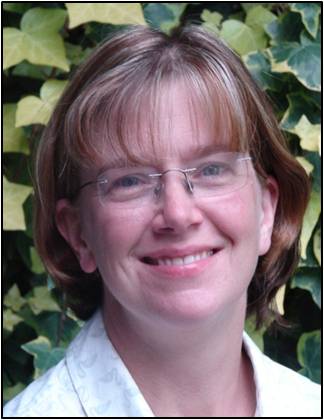Profile of Rebecca Ward
Rebecca is a part-time Research Associate and is also studying for a part-time PhD in Stochastic Simulation of Energy Demand of Buildings
 How did you get into Engineering?
How did you get into Engineering?
My father was a Professor of Engineering at Brunel University in the 1970s and my mother was a Maths teacher, and they obviously saw something in me that I didn’t even know existed myself as they gave me a woodworking tool set for my 4th birthday complete with saw, hammer and chisel! But they were right – I loved Maths and Physics at school and went on to study Physics at St. John’s College, Oxford, followed by an MSc in Structural Dynamics at Cranfield Institute of Technology, where Robin Langley was my supervisor. I liked the idea of using mathematical modeling as a tool for solving engineering problems and following my MSc I joined Atkins Engineering Sciences, first in the Fluids department and then in the Structural Dynamics department where I worked for about 10 years before having a career break to have a family.
What are you doing now and what are your plans for the future?
My career break was slightly longer than intended (9 years) but over that time I became very interested in buildings and how we use them, particularly in terms of their energy consumption. In 2011 I was fortunate enough to be awarded a Daphne Jackson Trust fellowship which is a returner’s fellowship specifically designed to help STEM specialists return to work following a career break. It was on the advice of Randall Thomas that I came to Cambridge to discuss the fellowship with Ruchi Choudhary and Allan McRobie, and it was their confidence in me that has led me to where I am now. I am currently working as a part time Research Associate while also studying for a part-time PhD in stochastic simulation of energy demand of buildings. For the immediate future my plans are to complete my PhD, but I’ve found that I really enjoy research and I’m keen to carry on in academia or a research institution.
What motivates you?
I am motivated by a desire to improve our use of resources for our own and future generations. Having children has made me view the world in a different way and I feel very strongly that I want to do my bit to make the world better for them.
What has helped your career – fellowships, support from the Department, inspirational teachers and colleagues?
All of the above! The Daphne Jackson Trust fellowship was a turning point for me, and I wouldn’t be where I am without the support from Ruchi Choudhary, Allan McRobie and Robert Mair who I first met when working at Atkins and who was instrumental in my application to study part time for a PhD. It also helps that I have a very supportive husband who is also an engineer; we met when I worked at Atkins, and I was fortunate enough to work there with a number of other inspirational colleagues with a fantastic work ethic.
How have you overcome challenges and knockbacks in your career?
I was initially refused the right to apply for a Daphne Jackson trust fellowship as I didn’t have a PhD but I fought that decision as I felt it was unjust and fortunately the Trust relented. However, I am a strong believer that when one door closes another tends to open, so when knock backs have occurred there has usually been an alternative path available which has proved to be a good path to follow. I went to Cranfield Institute of Technology to study for an MSc as my PhD funding at Oxford had been refused, but that led me on a path to a successful and enjoyable time as an engineering consultant at Atkins where I met my future husband and a number of inspirational colleagues.
How have you managed to balance family life and other interests with your career?
I have found that the academic life offers the flexibility needed for me to manage both career and family. When I was working as an engineering consultant I felt that at that time the job was too rigid for me personally to manage with a family – I didn’t want to commit to a workload that I might not be able to fulfill and I also felt at the time that part-time working would be difficult in a consultancy team. That is why I originally took a career break and for me it was the right decision. I now work predominantly remotely which is possible as my research is computer-based and it works well - I can fit my work in around the children and be at home when they need me. It is getting easier as the children get older and are more independent, and by the time I have finished my PhD I will be better situated to work in a more conventional manner.
Do you have any role models?
I have to say my mother is an inspiration – she was a working mother at a time when that was unusual and I’m immensely proud of her. I’m hoping to set the same example to my own children.
Do you have any advice for women who are considering pursuing a career in engineering?
It is a great career with widespread opportunities in a whole range of fields. I would strongly recommend getting work experience and trying out as many different fields as possible; different specialisms can require different skills and it’s worth finding out what truly interests you.
